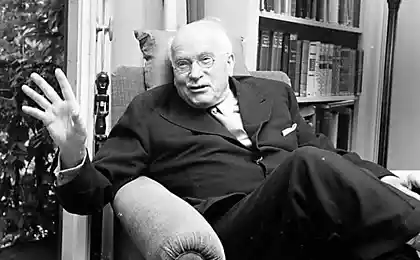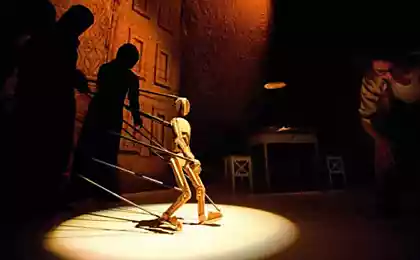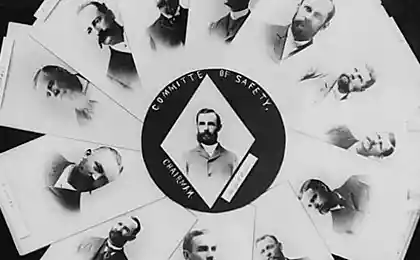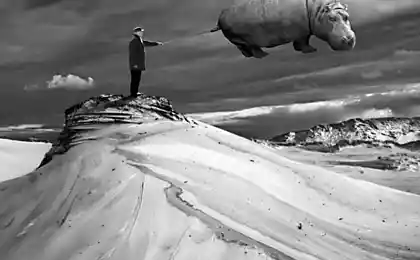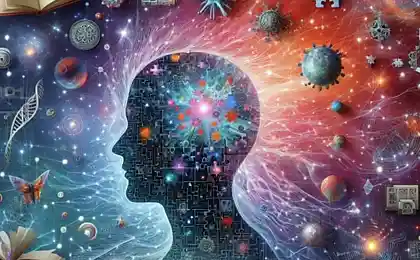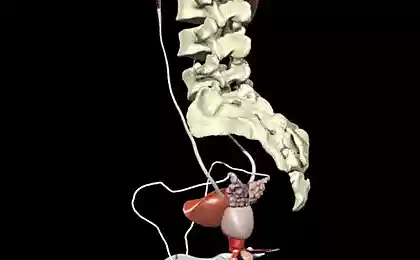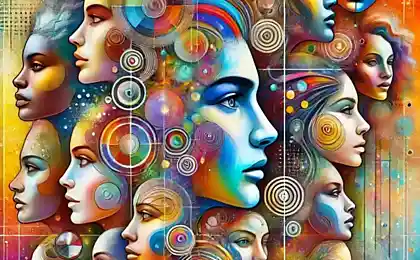338
Свобода личности или свобода индивида
The modern concept of freedom appeared during the Renaissance, which proclaimed man the measure of all things, personality as the highest social value, and individual freedom as the inalienable right of the individual to manifest his inner, spiritual life, thoughts, desires and feelings that distinguish him from others.

© Herbert List
In the subsequent period, the period of the Protestant Reformation, Protestantism narrowed the understanding of individual freedom to freedom in the individual interpretation of the Bible, freedom in the search for an individual path to God. In the nineteenth century, the materialist worldview supplanted its predecessors, the Renaissance and religious worldview, and freedom began to be understood as freedom for external forms of self-expression, primarily as freedom in economic activity, as freedom of action, freedom of movement, freedom to choose a lifestyle.
The Age of Progress has called into question the very necessity of man for spiritual freedom. The postulate of the English philosopher Hobbes: “People are looking not for freedom, but above all for security,” he substantiated the program of the new, coming materialistic civilization.
The West painlessly accepted the new concept of freedom as freedom in the creation of material wealth. Russia rejected this postulate, in the eyes of the Russian intelligentsia, it was the formula of World Evil, people must pay spiritual slavery for happiness in security.
The Grand Inquisitor, the incarnation of Evil in The Brothers Karamazov, says, as if to quote Hobbes: “Men do not strive for freedom, but for happiness, and happiness materially is bread and home.” Free them from spiritual pursuit, give them bread and shelter, and they will be happy. The Grand Inquisitor, according to Dostoevsky, is the Antichrist, his goal is to destroy the spiritual content of life.
Max Weber, an economist of the early twentieth century, in his classic work Capitalism and Protestant Ethics, showed how from the postulates of Protestantism, a religion that puts spiritual values above material values, capitalism grew, built on the priority of the material over the spiritual.
The advanced countries of the capitalist world of the nineteenth century, Germany and England, nevertheless, went down this path in slow motion, the load of centuries-old culture with its priority of spiritual over material slowed down the process. The United States did not have this ballast, America moved in the direction set by Progress much faster, which caused a sharp rejection of the Europeans.
I think that America, which claims to be a model of freedom, has dealt a terrible blow to the very idea of freedom. An impression of Charles Dickens after a trip to the United States.
Many Russian writers who traveled to America shared Dickens’ view, and they did not accept an American form of freedom in which there was no room for freedom of the spirit.
Maxim Gorky, who visited America in 1911: “People’s faces are still... In sad conceit, they consider themselves masters of their fate - in their eyes, at times, the consciousness of their independence shines, but apparently they do not understand that this is the independence of the axe in the hand of a carpenter, a hammer in the hand of a blacksmith, a brick in the hands of an invisible mason who cunningly laughs, builds for all one huge but cramped prison. There are many energetic faces, but on every face you see, first of all, teeth ... there is no true freedom, freedom of the inner, freedom of the spirit - it is not in the eyes of people ... never before have people seemed to me so insignificant, so enslaved.
Economic society sees freedom as the right of everyone to think only of himself. “Everyone thinks his own business” – “Each man for himself” Everyone has the right to do what they want, and whatever they want, “do your own thing” or “have it your own way,” do it their own way. On the other hand, everyone should be like everyone else. On these two contradictory postulates is built the idea of American freedom, its formula, “everyone is free to be like everyone else.”
American writer Henry Miller, in his novel Aero-Conditioned Nightmare: “To learn to live (in America) ... you must become like everyone else, then you are protected.” You have to turn yourself into zero, become indistinguishable from the whole herd. You can think, but think like everyone else. You can dream but have the same dreams as everyone else. If you think or dream differently, you are no longer an American, you are a foreigner in a hostile country. Once you have your own idea, you automatically drop out of the crowd. You are no longer an American.
Economic democracy protects the freedom of the individual, not the freedom of the individual, but the individual who acts and thinks like everyone else is not a person, he is part of the crowd, the mass, the individual is unique.
Spiritual search is not the goal of economic democracy; it offers a different kind of freedom, freedom to choose places of life, jobs, and personal life. But these kinds of freedom can only exist if a person is economically independent, and in modern society he is completely dependent on the mysterious play of economic forces.
In the early American Puritan communities, only those who owned property of at least £75 were considered free, only they had the status of a freeman. They could make decisions freely, ignoring the pressure of the majority. Only those who had this status had the right to participate in community decisions. The poor are dependent on others for their livelihood, have no sense of responsibility for their actions and therefore have no right to participate in decision-making.
In the first elections held after the victory of the American Revolution, only 6% of the population had the right to participate in the presidential election. After 40 years, suffrage was no longer tied to property status, but in practical life all decisions were made by the possessing class, which, unlike European countries, was not a hereditary aristocracy, but new rich people, nouveau riches, who came from the bottom.
And. V. Turchaninov, a colonel of the Russian General Staff who emigrated to the United States during the Civil War and became a brigadier general of the North’s army, wrote in a letter to Herzen: “I do not see real freedom here even a hair, this is the same collection of ridiculous European prejudices ... the only difference is that it is not the government, not the elite that controls the lamb herd, but the fussy, dollar-rattling, goat merchants.”
A contemporary of Turchaninov, Mark Twain, said that in conditions of economic democracy, in competitive struggle, the most shameless, the most assertive, acquiring their wealth at the expense of the weak have real freedom: “Freedom is the right of the strong to rob the weak.”
In a slave-holding society, the slave was not free because the master had the right to sell him. The peasant in feudal society was not free, he was completely dependent on the landlord, who owned the land, the main source of livelihood of the peasant, and could give or take it.
Before the Industrial Revolution, the American farmer, earning a living by his labor, fully providing for all his needs, was independent. But, in the course of the development of industrial society, the majority of the population became wage earners and received only one kind of freedom, the freedom to sell themselves, "sell yourself," in the free labor market.
From biblical times until the beginning of industrialization, a person who worked for someone else was considered a slave. Of course, today’s wage-worker has rights that the medieval peasant did not have, guaranteed by the Bill of Rights. But, these rights are illusory, because – Bill of Rights does not apply to economic relations.
Those who try to exercise this right are on the streets. There are few such fanatics. The vast majority abide by the rules of the game and prefer to proudly enumerate all their many political freedoms in the freest country in the world. In economic life, the worker has no freedoms other than the freedom to be unemployed and to become a social pariah.” American sociologist Charles Reich.
As Russian writer Sasha Sokolov, who immigrated to the United States in the 1990s, ironically notes in a letter to a friend in Russia, “You have no idea how much you have to sell here to be bought.” But freedom ...”
Or, as another Russian immigrant, Andrey Tum Bill of Rights, notes, “... the free market is much more effective in suppressing any protest against the system than the Soviet KGB.”
In the mid-90s, when there was a debate about the bill to create a free medical system, put forward by Congressman Richard Gerhardt, the IBM campaign sent letters to 110,000 of its employees, recommending that they call Congress and demand that the bill be removed from the vote. Employees at IBM were free to choose whether to comply or lose their jobs.
Protest is doomed from the outset; in a free market, man, in order to survive, must submit completely and unquestioningly to the written and unwritten laws of economics dictated by the strongest. The strongest, the corporations, create working conditions in which the worker, in order to survive, must follow the rules of corporate discipline, reminiscent of the army.
American soldiers are called GI (Government Item), which stands for "state property". The free American citizen is not the property of the state; he belongs to the economic machine. In the army, the behavior of a soldier is controlled by a system of punishments. In economics, employee behavior is controlled much more effectively by the carrot and the stick, the threat of dismissal and the system of privileges, bonuses, 13th salary, campaign shares.
The scope of freedom for the individual within the system is determined by the corporate economic system.
The Declaration of Independence in the Triad of Freedom, Equality and the Right to Seek Happiness puts Freedom first. In the practice of life, this is nothing more than an illusion, and it does not cease to be an illusion from the fact that it is shared by the majority, as well as millions of Soviet people who chanted “I do not know another country where a person breathes so freely.”
“You can do what you want here,” writes Shosset, a Russian immigrant who saw America in the 70s, as if repeating Gorky’s impression of America at the beginning of the century, “but there is no sense of freedom ... and in New York there are typical faces from the Leningrad escalator.” Lower jaw is pinched, no expression. They're tired. What freedom there is... life here is similar to what the socialism of the future was imagined in the 30s. Just now, everything on money as a means of control is held, and the results are the same.”
The Soviet and fascist regimes clearly articulated in their propaganda the subordination of the interests of the individual to the interests of the state, since, in an industrial society, individual freedom must be subordinated to the interests of economic and social development. Economic democracy has the same goals, but it never speaks openly about them; democracy uses a complex grid of substitutions.
“The average person perceives the freedom of expression of desires programmed in him by society as true, individual freedom. He doesn’t see the specific forces or people who are in charge of his life. The free market is invisible, anonymous, and therefore man concludes that he is free.” Erich Fromm.
On the one hand, a free economy frees the worker from the dictatorship of the state, from the pressure of the family clan, from the outdated traditional morality that binds him to action. On the other hand, it frees him from those spiritual, intellectual and emotional needs which do not fit into the standards of economic life.
The individual who has undergone the treatment of mass propaganda and mass culture is no longer able to understand that he has needs other than those imposed on him by the market and, although he has more forms of physical freedom and independence from the state than the Europeans, he is completely subordinate to the economy. Freedom, in its minimum expression, is at least an awareness of the existence of forces that limit it, but the majority not only does not realize, but also denies the very existence of these forces.
Sociologist Phillip Slater: With all the freedoms given to him by society, modern man is as defenseless against the forces he encounters in his daily life as primitive man is against the forces of nature he does not understand. He is helpless before anonymous social mechanisms, acting inexplicably and incomprehensible to the common man, they can lift him up or throw him down to the social bottom, he is defenseless against them, like primitive man before a thunderstorm or a hurricane.
Post-industrial society abolished the notion of poverty and granted many freedoms. Everyone is given a huge number of choices, but this is not a personal choice, this choice is programmed in a person by the system. The system fosters an understanding of freedom not as a right to be oneself, not as a right to make one’s own individual decisions, but as a right to the same form of life as everyone else.
During the American Youth Revolution of the 60s, individual freedom and the search for meaning in life became the landmarks of an entire generation. Young people, instinctively or consciously, saw the country’s powerful corporations as particularly dangerous. It was the large corporations, with their militarized structure and almost military discipline, who represented in their eyes everything negative in American life. Corporations were the complete antithesis of their vision of a society of just equality and individual freedom.
The film “Easy Rider”, released in the late sixties, was part of the “protest films”, as if talking about the rebellion of the individual against the diminishing personal freedom in the context of the growth of the power of corporations. The characters of the film have no criminal background, are not connected with the criminal world, these are ordinary guys from a provincial town, but they found an opportunity to realize the American Dream with one blow by reselling a large batch of drugs. Now, with a lot of money, they're free.
They move around the country on powerful motorcycles, on their jackets the American flag is a symbol of freedom. They did not gain their freedom, independence, and self-respect through hard work, 40 hours a week, doing monotonous, exhausting work day in and day out. They found the easy way without paying a prison sentence for their risky venture, and this evokes the admiration of the viewer, who, in order to achieve not even freedom, but a minimum level of economic independence, must spend many years at work.
The inhabitants of the small towns of middle America, through which heroes pass, are habitually living in penniless conditions, struggling to make ends meet from generation to generation, and those who have achieved wealth bypassing the path of hard and poorly paid work cannot but arouse in them heavy, lead hatred. Judging by the film, the reason for this hatred, envy, a sense of personal failure. In the final, the villagers score heroes to death with baseball bats.
From the point of view of legal and moral law, the characters of the film are criminals, but the sale of drugs was perceived by the viewer not as a violation of moral norms, but as a revolt against the system. But the system itself stimulates the search for new, often illegal ways to get rich, and the characters of the film are part of the system, their values of life are the same as those of the majority, who believe that only money brings freedom.
During the youth revolt of the 60s, the crime rate increased sharply, but the bulk of the rebels, on the slogans of demonstrations of nonviolent protest, quoted the Bible - "Love your neighbor as yourself", the spiritual growth of man was proclaimed the only true goal. The lofty ideals of a new generation were in conflict with the ideals of fathers who remembered the times of hunger and poverty of the Great Depression and accepted the security of the postwar years as the highest achievement of their lives.
The youth protest stirred up the whole country, its program was the rock opera “Jesus Christ is a superstar”, the biblical canon “all men are brothers” acquired a new life, the formula “everyone for himself” was rejected, everyone should bear personal responsibility for what happens to others.
But gradually the intensity of passions subsided, the rebels, growing up, began to perceive personal responsibility as responsibility only for themselves, and returned to the established course, returned to the formula of life of fathers, “everyone for himself.” It turned out that it was impossible to break the system, there was only one alternative, to adapt. But the rejection of the system in the generation of baby boomers (the post-war generation) remained, it ceased to be visible, lost the features of organized protest, in conditions of total control, the rebellion began to be expressed only individually, and therefore acquired pathological, extreme forms.
The film of the mid-'80s, Natural Born Killers, showed what the ideals of freedom became 10 years after the end of the youth revolution. The characters of the film resemble the images of the young rebels of the 60s, created by actors Marlon Brando and James Dean, but they understand personal freedom differently, not as a right to oneself, not the right to be oneself, for them freedom is the freedom to kill. It is the only form of self-expression available to them, power over the circumstances of their lives, in which they feel completely helpless.
Shooting the crowd is their only opportunity for self-assertion and individual freedom. In the eyes of the characters of the film, as in the eyes of the audience of the 80s, individual freedom is freedom from obligations to others, freedom from society. The word freedom, which was so often used in the 60s, lost its content, turned into a blanket of a generally accepted demagogic dictionary.
Civil rights were won, but the moral code, the moral rightness of protecting the rights of the individual, on which the youth protest was built, disappeared. Today, belief in freedom is nothing more than ritual, proforma, observance of external decency, behind which there is no sincere conviction or absolute faith.
The rebels of previous eras had chances of success, as long as society believed in the highest authority, the authority of individual freedom, the freedom of inner life, standing above the authority of force and power, the moral principles that the rebels defended, resonated in the public consciousness. Today’s rebels are following in the direction outlined by Natural Born Killers. Teenagers shooting their peers with machine guns in American schools, as well as their prototypes in the movies, only in violence against others see the only form of self-expression.
“Society limits the expression of individuality, leading to aggression and violence unprecedented in the history of mankind in peacetime. In big cities, at the beginning and end of the workday, millions of people locked in their car booths, completely isolated from each other, eager to break out of traffic, hate each other to such an extent that if they had the opportunity to destroy all those thousands of cars around them, they would do so without hesitation, obeying the impulse of hate. Sociologist Philip Slater.
Society nurtures aggressiveness, a necessary quality in an atmosphere of universal competition, and at the same time suppresses it. The growing press leads to a backlash, to the release of the latent aggressive energy in its most extreme forms. In recent decades, an unprecedented number of serial killers have appeared, and their appearance is not accidental. The greater the pressure, the greater the resistance. This is an indicator of the reaction of people squeezed into the narrow framework of the rituals of “freedom”.
Serial killers want to prove to themselves and to society that they are not a “trembling creature”, that they are not cogs of a machine, that they are individuals with free will, that they, unlike the masses, are capable of crossing the last frontier, the last prohibition.
The story of London’s Jack the Ripper in Victorian Britain has stunned the imagination of the civilized world for a century. Today Jackie the Rippers appear almost every year and no one is surprised. The number of crimes outside of economic motives increased, shooting at colleagues in the office, at passengers in the subway or other drivers on the road. The growth of crimes that previously could not imagine the most unbridled imagination, today have become commonplace and familiar. Sadism, masochism, ritual cannibalism, Satanism, once on the periphery of public attention, are advancing to the forefront, gaining more and more followers.
This is an irrational, spontaneous reaction to the lack of freedom of real choice, an unconscious rebellion against the whole system of life, built on the substitution of real freedom with those forms that bring economic dividends to society. Protest is expressed in the form of irrational, extreme, antisocial forms of behavior, because resistance to comprehensive and anonymous control is impossible at a rational level.
The system suppresses the uniqueness of man, which inevitably finds a way out, and this is an outlet to extreme forms, in eccentricity, Satanism, sadomasochism, promiscuity, brutal violence. Sociologist Philip Slater.
But bans on these extreme desires are already in the past, they are safe for the system itself, their service increases employment of certain segments of the population, increases income and is taxed. Consumer society legalizes everything that leads to the development of the economy, and the economy is built on the satisfaction of the desires of customers.
In Kubrick's film Clockwork Orange, the protagonist cannot legally get what he wants, he is denied the right to violence that brings him pleasure. His right to personal liberty is limited. In Kubrick’s film, those who seek to curb the violent instincts of the protagonist, Alex, use violence as a form of control. Only the ruling class has the right to violence, organized violence.
In the average man, in order for him to function properly as a member of society, all instincts must be either castrated or directed to a safe channel for power. Criminals often consider their crimes a political act. And, indeed, if propaganda speaks of the main feature of democracy, freedom, then punishments for freedom of expression are a violation of the basic political right of the citizen.
The idea of freedom was carried to its logical end by the Marquis de Sade. A staunch republican and revolutionary, the Marquis de Sade was the most consistent in the development of Enlightenment ideas about freedom. De Sade's logic is that democracy, following its principles, must give everyone the right to freedom of hidden desires, and since the lust for violence lives in everyone, it must be all, violence must be democratized.
Marquis de Sade was the first to see that absolute individualism must lead to organized anarchy, in which the exploitation of all makes violence against others an organic part of the enjoyment of life. De Sade put only one sexual aspect at the center of his utopian future, but his prediction was correct, the logic of absolute freedom and irresponsibility of the individual to society and other people should lead to the formation of a society without morality, a society built on the right of the strong. Christopher Lash, sociologist.
Hitler was called the loudspeaker of the nation, who, appealing to the crowd, spoke out loud about what was not customary to talk about, about the right to hidden desires, to dark instincts within each person, and gave an excuse, a justification for the right to use violence in public relations.
Fascism used the lust for violence that lives in every person and the aggressive instincts of the mob to achieve political goals. Economic democracy sublimates aggressiveness, channeling it into the safe channel of those desires that correspond to the interests of the economy, increasing physical comfort and various entertainments.
Socialism, which grew up on the ideas of the Enlightenment, presupposes the disappearance of any power, of any form of violence; it was not for nothing that Lenin spoke of the disappearance of the state. But in economic democracy, violence does not disappear, it only takes on civilized forms. The system narrows freedom broadly to freedom of consumption, physically defined and tangible.
What will I gain if I have spiritual freedom? Will spiritual freedom help me to buy a new house or the latest model of the car?
Real freedom is the freedom to express oneself as a person in the fundamental spheres of life, and it is precisely in this sphere that a member of an economic society does not have freedom. But he has freedom of movement, freedom to change jobs, freedom of consumption, and spiritual freedom for him is an abstract phantom, a phrase that has no concrete content.
And this is not a phenomenon of today, it is a characteristic feature of the most materialistic civilization, which denies the spiritual principle. As Alexis Tocqueville wrote in 1836, “What is staggering about America is not a steady movement and constant change, but human existence is extremely monotonous and monotonous, because all change and incessant movement change nothing in the content, in the essence of life itself.” Man is in motion, but this movement is purely physical, his inner world is immovable.
Freedom of the spirit, freedom of internal life, was one of the basic values, one of the goals of Progress, the means of its realization was to become a developed economy. By giving the masses decent forms of existence, society can stimulate the growth of spiritual wealth free from the struggle for physical survival. But in the process of economic development, the means became the goal.
A society composed of free individuals with distinct individuality was a dream only at the very beginning of the Age of Progress, when the cultural traditions of aristocratic society were still strong. Today it is already a bygone atavism, in the process of economic growth and the creation of a mass society, the unique personality rising above the faceless crowd has lost its former value. A mass society is a society of equals that rejects anything that rises above the average.
© Michel Hoffman, PhD, Columbia University, New York. published
Source: psyfactor.org

© Herbert List
In the subsequent period, the period of the Protestant Reformation, Protestantism narrowed the understanding of individual freedom to freedom in the individual interpretation of the Bible, freedom in the search for an individual path to God. In the nineteenth century, the materialist worldview supplanted its predecessors, the Renaissance and religious worldview, and freedom began to be understood as freedom for external forms of self-expression, primarily as freedom in economic activity, as freedom of action, freedom of movement, freedom to choose a lifestyle.
The Age of Progress has called into question the very necessity of man for spiritual freedom. The postulate of the English philosopher Hobbes: “People are looking not for freedom, but above all for security,” he substantiated the program of the new, coming materialistic civilization.
The West painlessly accepted the new concept of freedom as freedom in the creation of material wealth. Russia rejected this postulate, in the eyes of the Russian intelligentsia, it was the formula of World Evil, people must pay spiritual slavery for happiness in security.
The Grand Inquisitor, the incarnation of Evil in The Brothers Karamazov, says, as if to quote Hobbes: “Men do not strive for freedom, but for happiness, and happiness materially is bread and home.” Free them from spiritual pursuit, give them bread and shelter, and they will be happy. The Grand Inquisitor, according to Dostoevsky, is the Antichrist, his goal is to destroy the spiritual content of life.
Max Weber, an economist of the early twentieth century, in his classic work Capitalism and Protestant Ethics, showed how from the postulates of Protestantism, a religion that puts spiritual values above material values, capitalism grew, built on the priority of the material over the spiritual.
The advanced countries of the capitalist world of the nineteenth century, Germany and England, nevertheless, went down this path in slow motion, the load of centuries-old culture with its priority of spiritual over material slowed down the process. The United States did not have this ballast, America moved in the direction set by Progress much faster, which caused a sharp rejection of the Europeans.
I think that America, which claims to be a model of freedom, has dealt a terrible blow to the very idea of freedom. An impression of Charles Dickens after a trip to the United States.
Many Russian writers who traveled to America shared Dickens’ view, and they did not accept an American form of freedom in which there was no room for freedom of the spirit.
Maxim Gorky, who visited America in 1911: “People’s faces are still... In sad conceit, they consider themselves masters of their fate - in their eyes, at times, the consciousness of their independence shines, but apparently they do not understand that this is the independence of the axe in the hand of a carpenter, a hammer in the hand of a blacksmith, a brick in the hands of an invisible mason who cunningly laughs, builds for all one huge but cramped prison. There are many energetic faces, but on every face you see, first of all, teeth ... there is no true freedom, freedom of the inner, freedom of the spirit - it is not in the eyes of people ... never before have people seemed to me so insignificant, so enslaved.
Economic society sees freedom as the right of everyone to think only of himself. “Everyone thinks his own business” – “Each man for himself” Everyone has the right to do what they want, and whatever they want, “do your own thing” or “have it your own way,” do it their own way. On the other hand, everyone should be like everyone else. On these two contradictory postulates is built the idea of American freedom, its formula, “everyone is free to be like everyone else.”
American writer Henry Miller, in his novel Aero-Conditioned Nightmare: “To learn to live (in America) ... you must become like everyone else, then you are protected.” You have to turn yourself into zero, become indistinguishable from the whole herd. You can think, but think like everyone else. You can dream but have the same dreams as everyone else. If you think or dream differently, you are no longer an American, you are a foreigner in a hostile country. Once you have your own idea, you automatically drop out of the crowd. You are no longer an American.
Economic democracy protects the freedom of the individual, not the freedom of the individual, but the individual who acts and thinks like everyone else is not a person, he is part of the crowd, the mass, the individual is unique.
Spiritual search is not the goal of economic democracy; it offers a different kind of freedom, freedom to choose places of life, jobs, and personal life. But these kinds of freedom can only exist if a person is economically independent, and in modern society he is completely dependent on the mysterious play of economic forces.
In the early American Puritan communities, only those who owned property of at least £75 were considered free, only they had the status of a freeman. They could make decisions freely, ignoring the pressure of the majority. Only those who had this status had the right to participate in community decisions. The poor are dependent on others for their livelihood, have no sense of responsibility for their actions and therefore have no right to participate in decision-making.
In the first elections held after the victory of the American Revolution, only 6% of the population had the right to participate in the presidential election. After 40 years, suffrage was no longer tied to property status, but in practical life all decisions were made by the possessing class, which, unlike European countries, was not a hereditary aristocracy, but new rich people, nouveau riches, who came from the bottom.
And. V. Turchaninov, a colonel of the Russian General Staff who emigrated to the United States during the Civil War and became a brigadier general of the North’s army, wrote in a letter to Herzen: “I do not see real freedom here even a hair, this is the same collection of ridiculous European prejudices ... the only difference is that it is not the government, not the elite that controls the lamb herd, but the fussy, dollar-rattling, goat merchants.”
A contemporary of Turchaninov, Mark Twain, said that in conditions of economic democracy, in competitive struggle, the most shameless, the most assertive, acquiring their wealth at the expense of the weak have real freedom: “Freedom is the right of the strong to rob the weak.”
In a slave-holding society, the slave was not free because the master had the right to sell him. The peasant in feudal society was not free, he was completely dependent on the landlord, who owned the land, the main source of livelihood of the peasant, and could give or take it.
Before the Industrial Revolution, the American farmer, earning a living by his labor, fully providing for all his needs, was independent. But, in the course of the development of industrial society, the majority of the population became wage earners and received only one kind of freedom, the freedom to sell themselves, "sell yourself," in the free labor market.
From biblical times until the beginning of industrialization, a person who worked for someone else was considered a slave. Of course, today’s wage-worker has rights that the medieval peasant did not have, guaranteed by the Bill of Rights. But, these rights are illusory, because – Bill of Rights does not apply to economic relations.
Those who try to exercise this right are on the streets. There are few such fanatics. The vast majority abide by the rules of the game and prefer to proudly enumerate all their many political freedoms in the freest country in the world. In economic life, the worker has no freedoms other than the freedom to be unemployed and to become a social pariah.” American sociologist Charles Reich.
As Russian writer Sasha Sokolov, who immigrated to the United States in the 1990s, ironically notes in a letter to a friend in Russia, “You have no idea how much you have to sell here to be bought.” But freedom ...”
Or, as another Russian immigrant, Andrey Tum Bill of Rights, notes, “... the free market is much more effective in suppressing any protest against the system than the Soviet KGB.”
In the mid-90s, when there was a debate about the bill to create a free medical system, put forward by Congressman Richard Gerhardt, the IBM campaign sent letters to 110,000 of its employees, recommending that they call Congress and demand that the bill be removed from the vote. Employees at IBM were free to choose whether to comply or lose their jobs.
Protest is doomed from the outset; in a free market, man, in order to survive, must submit completely and unquestioningly to the written and unwritten laws of economics dictated by the strongest. The strongest, the corporations, create working conditions in which the worker, in order to survive, must follow the rules of corporate discipline, reminiscent of the army.
American soldiers are called GI (Government Item), which stands for "state property". The free American citizen is not the property of the state; he belongs to the economic machine. In the army, the behavior of a soldier is controlled by a system of punishments. In economics, employee behavior is controlled much more effectively by the carrot and the stick, the threat of dismissal and the system of privileges, bonuses, 13th salary, campaign shares.
The scope of freedom for the individual within the system is determined by the corporate economic system.
The Declaration of Independence in the Triad of Freedom, Equality and the Right to Seek Happiness puts Freedom first. In the practice of life, this is nothing more than an illusion, and it does not cease to be an illusion from the fact that it is shared by the majority, as well as millions of Soviet people who chanted “I do not know another country where a person breathes so freely.”
“You can do what you want here,” writes Shosset, a Russian immigrant who saw America in the 70s, as if repeating Gorky’s impression of America at the beginning of the century, “but there is no sense of freedom ... and in New York there are typical faces from the Leningrad escalator.” Lower jaw is pinched, no expression. They're tired. What freedom there is... life here is similar to what the socialism of the future was imagined in the 30s. Just now, everything on money as a means of control is held, and the results are the same.”
The Soviet and fascist regimes clearly articulated in their propaganda the subordination of the interests of the individual to the interests of the state, since, in an industrial society, individual freedom must be subordinated to the interests of economic and social development. Economic democracy has the same goals, but it never speaks openly about them; democracy uses a complex grid of substitutions.
“The average person perceives the freedom of expression of desires programmed in him by society as true, individual freedom. He doesn’t see the specific forces or people who are in charge of his life. The free market is invisible, anonymous, and therefore man concludes that he is free.” Erich Fromm.
On the one hand, a free economy frees the worker from the dictatorship of the state, from the pressure of the family clan, from the outdated traditional morality that binds him to action. On the other hand, it frees him from those spiritual, intellectual and emotional needs which do not fit into the standards of economic life.
The individual who has undergone the treatment of mass propaganda and mass culture is no longer able to understand that he has needs other than those imposed on him by the market and, although he has more forms of physical freedom and independence from the state than the Europeans, he is completely subordinate to the economy. Freedom, in its minimum expression, is at least an awareness of the existence of forces that limit it, but the majority not only does not realize, but also denies the very existence of these forces.
Sociologist Phillip Slater: With all the freedoms given to him by society, modern man is as defenseless against the forces he encounters in his daily life as primitive man is against the forces of nature he does not understand. He is helpless before anonymous social mechanisms, acting inexplicably and incomprehensible to the common man, they can lift him up or throw him down to the social bottom, he is defenseless against them, like primitive man before a thunderstorm or a hurricane.
Post-industrial society abolished the notion of poverty and granted many freedoms. Everyone is given a huge number of choices, but this is not a personal choice, this choice is programmed in a person by the system. The system fosters an understanding of freedom not as a right to be oneself, not as a right to make one’s own individual decisions, but as a right to the same form of life as everyone else.
During the American Youth Revolution of the 60s, individual freedom and the search for meaning in life became the landmarks of an entire generation. Young people, instinctively or consciously, saw the country’s powerful corporations as particularly dangerous. It was the large corporations, with their militarized structure and almost military discipline, who represented in their eyes everything negative in American life. Corporations were the complete antithesis of their vision of a society of just equality and individual freedom.
The film “Easy Rider”, released in the late sixties, was part of the “protest films”, as if talking about the rebellion of the individual against the diminishing personal freedom in the context of the growth of the power of corporations. The characters of the film have no criminal background, are not connected with the criminal world, these are ordinary guys from a provincial town, but they found an opportunity to realize the American Dream with one blow by reselling a large batch of drugs. Now, with a lot of money, they're free.
They move around the country on powerful motorcycles, on their jackets the American flag is a symbol of freedom. They did not gain their freedom, independence, and self-respect through hard work, 40 hours a week, doing monotonous, exhausting work day in and day out. They found the easy way without paying a prison sentence for their risky venture, and this evokes the admiration of the viewer, who, in order to achieve not even freedom, but a minimum level of economic independence, must spend many years at work.
The inhabitants of the small towns of middle America, through which heroes pass, are habitually living in penniless conditions, struggling to make ends meet from generation to generation, and those who have achieved wealth bypassing the path of hard and poorly paid work cannot but arouse in them heavy, lead hatred. Judging by the film, the reason for this hatred, envy, a sense of personal failure. In the final, the villagers score heroes to death with baseball bats.
From the point of view of legal and moral law, the characters of the film are criminals, but the sale of drugs was perceived by the viewer not as a violation of moral norms, but as a revolt against the system. But the system itself stimulates the search for new, often illegal ways to get rich, and the characters of the film are part of the system, their values of life are the same as those of the majority, who believe that only money brings freedom.
During the youth revolt of the 60s, the crime rate increased sharply, but the bulk of the rebels, on the slogans of demonstrations of nonviolent protest, quoted the Bible - "Love your neighbor as yourself", the spiritual growth of man was proclaimed the only true goal. The lofty ideals of a new generation were in conflict with the ideals of fathers who remembered the times of hunger and poverty of the Great Depression and accepted the security of the postwar years as the highest achievement of their lives.
The youth protest stirred up the whole country, its program was the rock opera “Jesus Christ is a superstar”, the biblical canon “all men are brothers” acquired a new life, the formula “everyone for himself” was rejected, everyone should bear personal responsibility for what happens to others.
But gradually the intensity of passions subsided, the rebels, growing up, began to perceive personal responsibility as responsibility only for themselves, and returned to the established course, returned to the formula of life of fathers, “everyone for himself.” It turned out that it was impossible to break the system, there was only one alternative, to adapt. But the rejection of the system in the generation of baby boomers (the post-war generation) remained, it ceased to be visible, lost the features of organized protest, in conditions of total control, the rebellion began to be expressed only individually, and therefore acquired pathological, extreme forms.
The film of the mid-'80s, Natural Born Killers, showed what the ideals of freedom became 10 years after the end of the youth revolution. The characters of the film resemble the images of the young rebels of the 60s, created by actors Marlon Brando and James Dean, but they understand personal freedom differently, not as a right to oneself, not the right to be oneself, for them freedom is the freedom to kill. It is the only form of self-expression available to them, power over the circumstances of their lives, in which they feel completely helpless.
Shooting the crowd is their only opportunity for self-assertion and individual freedom. In the eyes of the characters of the film, as in the eyes of the audience of the 80s, individual freedom is freedom from obligations to others, freedom from society. The word freedom, which was so often used in the 60s, lost its content, turned into a blanket of a generally accepted demagogic dictionary.
Civil rights were won, but the moral code, the moral rightness of protecting the rights of the individual, on which the youth protest was built, disappeared. Today, belief in freedom is nothing more than ritual, proforma, observance of external decency, behind which there is no sincere conviction or absolute faith.
The rebels of previous eras had chances of success, as long as society believed in the highest authority, the authority of individual freedom, the freedom of inner life, standing above the authority of force and power, the moral principles that the rebels defended, resonated in the public consciousness. Today’s rebels are following in the direction outlined by Natural Born Killers. Teenagers shooting their peers with machine guns in American schools, as well as their prototypes in the movies, only in violence against others see the only form of self-expression.
“Society limits the expression of individuality, leading to aggression and violence unprecedented in the history of mankind in peacetime. In big cities, at the beginning and end of the workday, millions of people locked in their car booths, completely isolated from each other, eager to break out of traffic, hate each other to such an extent that if they had the opportunity to destroy all those thousands of cars around them, they would do so without hesitation, obeying the impulse of hate. Sociologist Philip Slater.
Society nurtures aggressiveness, a necessary quality in an atmosphere of universal competition, and at the same time suppresses it. The growing press leads to a backlash, to the release of the latent aggressive energy in its most extreme forms. In recent decades, an unprecedented number of serial killers have appeared, and their appearance is not accidental. The greater the pressure, the greater the resistance. This is an indicator of the reaction of people squeezed into the narrow framework of the rituals of “freedom”.
Serial killers want to prove to themselves and to society that they are not a “trembling creature”, that they are not cogs of a machine, that they are individuals with free will, that they, unlike the masses, are capable of crossing the last frontier, the last prohibition.
The story of London’s Jack the Ripper in Victorian Britain has stunned the imagination of the civilized world for a century. Today Jackie the Rippers appear almost every year and no one is surprised. The number of crimes outside of economic motives increased, shooting at colleagues in the office, at passengers in the subway or other drivers on the road. The growth of crimes that previously could not imagine the most unbridled imagination, today have become commonplace and familiar. Sadism, masochism, ritual cannibalism, Satanism, once on the periphery of public attention, are advancing to the forefront, gaining more and more followers.
This is an irrational, spontaneous reaction to the lack of freedom of real choice, an unconscious rebellion against the whole system of life, built on the substitution of real freedom with those forms that bring economic dividends to society. Protest is expressed in the form of irrational, extreme, antisocial forms of behavior, because resistance to comprehensive and anonymous control is impossible at a rational level.
The system suppresses the uniqueness of man, which inevitably finds a way out, and this is an outlet to extreme forms, in eccentricity, Satanism, sadomasochism, promiscuity, brutal violence. Sociologist Philip Slater.
But bans on these extreme desires are already in the past, they are safe for the system itself, their service increases employment of certain segments of the population, increases income and is taxed. Consumer society legalizes everything that leads to the development of the economy, and the economy is built on the satisfaction of the desires of customers.
In Kubrick's film Clockwork Orange, the protagonist cannot legally get what he wants, he is denied the right to violence that brings him pleasure. His right to personal liberty is limited. In Kubrick’s film, those who seek to curb the violent instincts of the protagonist, Alex, use violence as a form of control. Only the ruling class has the right to violence, organized violence.
In the average man, in order for him to function properly as a member of society, all instincts must be either castrated or directed to a safe channel for power. Criminals often consider their crimes a political act. And, indeed, if propaganda speaks of the main feature of democracy, freedom, then punishments for freedom of expression are a violation of the basic political right of the citizen.
The idea of freedom was carried to its logical end by the Marquis de Sade. A staunch republican and revolutionary, the Marquis de Sade was the most consistent in the development of Enlightenment ideas about freedom. De Sade's logic is that democracy, following its principles, must give everyone the right to freedom of hidden desires, and since the lust for violence lives in everyone, it must be all, violence must be democratized.
Marquis de Sade was the first to see that absolute individualism must lead to organized anarchy, in which the exploitation of all makes violence against others an organic part of the enjoyment of life. De Sade put only one sexual aspect at the center of his utopian future, but his prediction was correct, the logic of absolute freedom and irresponsibility of the individual to society and other people should lead to the formation of a society without morality, a society built on the right of the strong. Christopher Lash, sociologist.
Hitler was called the loudspeaker of the nation, who, appealing to the crowd, spoke out loud about what was not customary to talk about, about the right to hidden desires, to dark instincts within each person, and gave an excuse, a justification for the right to use violence in public relations.
Fascism used the lust for violence that lives in every person and the aggressive instincts of the mob to achieve political goals. Economic democracy sublimates aggressiveness, channeling it into the safe channel of those desires that correspond to the interests of the economy, increasing physical comfort and various entertainments.
Socialism, which grew up on the ideas of the Enlightenment, presupposes the disappearance of any power, of any form of violence; it was not for nothing that Lenin spoke of the disappearance of the state. But in economic democracy, violence does not disappear, it only takes on civilized forms. The system narrows freedom broadly to freedom of consumption, physically defined and tangible.
What will I gain if I have spiritual freedom? Will spiritual freedom help me to buy a new house or the latest model of the car?
Real freedom is the freedom to express oneself as a person in the fundamental spheres of life, and it is precisely in this sphere that a member of an economic society does not have freedom. But he has freedom of movement, freedom to change jobs, freedom of consumption, and spiritual freedom for him is an abstract phantom, a phrase that has no concrete content.
And this is not a phenomenon of today, it is a characteristic feature of the most materialistic civilization, which denies the spiritual principle. As Alexis Tocqueville wrote in 1836, “What is staggering about America is not a steady movement and constant change, but human existence is extremely monotonous and monotonous, because all change and incessant movement change nothing in the content, in the essence of life itself.” Man is in motion, but this movement is purely physical, his inner world is immovable.
Freedom of the spirit, freedom of internal life, was one of the basic values, one of the goals of Progress, the means of its realization was to become a developed economy. By giving the masses decent forms of existence, society can stimulate the growth of spiritual wealth free from the struggle for physical survival. But in the process of economic development, the means became the goal.
A society composed of free individuals with distinct individuality was a dream only at the very beginning of the Age of Progress, when the cultural traditions of aristocratic society were still strong. Today it is already a bygone atavism, in the process of economic growth and the creation of a mass society, the unique personality rising above the faceless crowd has lost its former value. A mass society is a society of equals that rejects anything that rises above the average.
© Michel Hoffman, PhD, Columbia University, New York. published
Source: psyfactor.org
